2001: A Space Odyssey 4K Blu-ray Movie
Home2001: A Space Odyssey 4K Blu-ray Movie 
4K Ultra HD + Blu-rayThe Film Vault | 1968 | 149 min | Rated BBFC: 12 | Oct 02, 2023
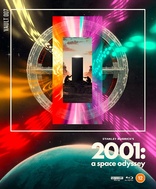
Movie rating
8.7 | / 10 |
Blu-ray rating
| Users | 0.0 | |
| Reviewer | 5.0 | |
| Overall | 5.0 |
Overview
2001: A Space Odyssey 4K (1968)
A mysterious black monolith appears on Earth in prehistoric times, changing the course of human evolution. When it reappears on the Moon in 2001, astronauts embark on an ill-fated interplanetary voyage to discover.
Starring: Keir Dullea, Gary Lockwood, William Sylvester, Daniel Richter, Leonard RossiterDirector: Stanley Kubrick
| Drama | Uncertain |
| Epic | Uncertain |
| Mystery | Uncertain |
| Sci-Fi | Uncertain |
| Adventure | Uncertain |
Specifications
Video
Video codec: HEVC / H.265
Video resolution: 4K (2160p)
Aspect ratio: 2.20:1
Original aspect ratio: 2.20:1
Audio
English: DTS-HD Master Audio 5.1
Spanish: Dolby Digital 5.1
French: Dolby Digital 5.1
German: Dolby Digital 5.1
Italian: Dolby Digital 5.1
Portuguese: Dolby Digital 2.0
Polish: Dolby Digital 2.0
English: Dolby Digital 2.0
Subtitles
English SDH, French SDH, German SDH, Italian SDH, Portuguese, Spanish SDH, Arabic, Cantonese, Catalan, Croatian
Discs
Blu-ray Disc
Two-disc set (2 BDs)
4K Ultra HD
Packaging
Slipcover in original pressing
Playback
Region free
Review
Rating summary
| Movie | 5.0 | |
| Video | 0.0 | |
| Audio | 5.0 | |
| Extras | 5.0 | |
| Overall | 5.0 |
2001: A Space Odyssey 4K Blu-ray Movie Review
Reviewed by Jeffrey Kauffman September 28, 2023The Film Vault is back with another pretty extravagantly packaged quartet of titles to complement the four equally lavishly appointed releases they offered last year, 1917 4K, Blade Runner 4K, GoodFellas 4K, and Scarface 4K. Along with design and package contents that are obviously meant to make this new foursome fit in right next to the previous four, like last year's assortment, this year's offerings are split evenly, two apiece, between films coming from either Warner Brothers (this film and The Shawshank Redemption 4K ) or Universal (Apollo 13 4K and Jaws 4K).
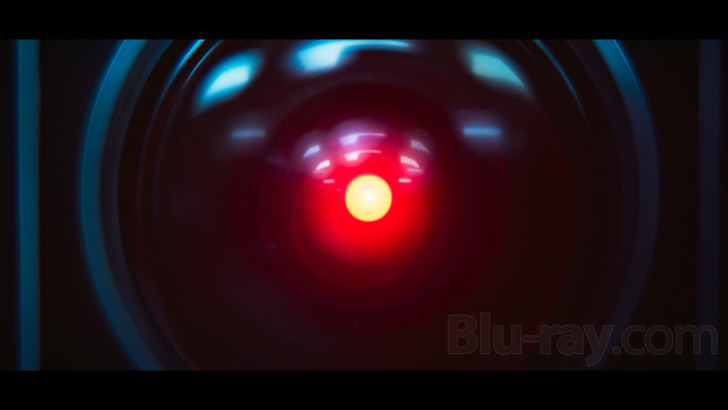
As with last year's assortment of releases, this year's offerings have had prior releases that have been previously reviewed here, and for those wanting things like plot recaps, reactions, lists of supplements and technical assessments, hopefully my 2001: A Space Odyssey 4K Blu-ray review of the Region A release from Warner Brothers will suffice.
2001: A Space Odyssey 4K Blu-ray Movie, Video Quality 
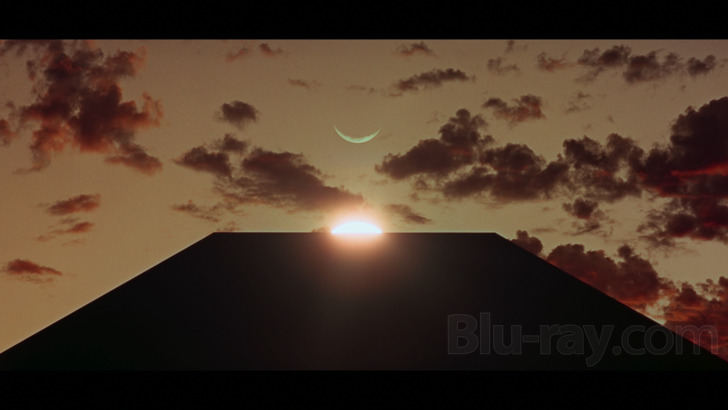
Note: Somewhat interestingly if problematically for those who like screenshots, this is the first Film Vault release that does not include a
1080
disc with the feature film. The 1080 disc in this
set duplicates the 1080 disc of supplements that was offered in Warner's own Region A release of the film in 4K, and since the 4K disc in this set also
basically replicates the 4K disc in the Warner set, I felt that the best option for this review was to provide screenshots from Warner's 1080 version for
Region A, as I did for the Region A 4K UHD review. You'll note that the 2K score above is also left blank since there's no 2K presentation of the
feature film.
2001: A Space Odyssey is presented on 4K UHD courtesy of The Film Vault with an HEVC / H.265 encoded 2160p transfer in
2.20:1. To cut to the chase, aside from different silk screen labels on the discs, this appears to duplicate the Warner 4K UHD release, down to
chapter stops and (based on some admittedly nonscientific observations) bitrates. I'll therefore repeat a lot of what I stated about the Warner's 4K
release here.
As was
documented in an actually fascinating two page "history" of the restoration provided by Warner's Stuart Herriott for Warner's release, "the 2018
release
contains correct picture aspect ratio as it was scanned directly from the 65mm original negative which is spherical (flat) versus anamorphic (scope).
The 35mm anamorphic (scope) reduction that was scanned for the 2000 and 2007 releases contained a little more information on the left and right
of the frame then [sic] was intended for 2.2 70mm projection aspect ratio. Also, the optical scope reduction added a slight amount of linear image
distortion, which is not present in the 65mm spherical camera negative." Mr. Herriott's detailed accounting of the long and involved restoration
process, which Mr. Herriott traces back to photochemical work begun in 1999 (if I'm understanding things correctly) makes it clear that Warner,
typically a commendable curator of its catalog, has approached this title with the care and handling that it deserves, and those who were fearful of
things like Christopher Nolan's perceived "revisionism" can probably relax. So, with that out of the way: how does the darned thing look?
Pretty
spectacular in sum, though as Mr. Herriott also gets into, those who are going to utilize previous home video releases as the standard against which
this release is measured may quibble with some aspects, notably the color timing, which is noticeably different in some respects from previous
releases. As Mr. Herriott mentions, "audiences may be most familiar with previous home video releases. . .and may be struck by some of the
differences. However, the newly remastered version has been scanned and timed to directly match the original film release, rather than the
previous home video master." Some of the most noticeable differences happen right off the bat in The Dawn of Man sequence, where there's a
slightly more desaturated look, with a brighter overall ambience that tends to make skies paler. But there are some interesting new changes here,
albeit often on minor things like the weirdly mid(21st?)century modern chairs on the space station, which have a kind of crimson tone to them now.
Restoration efforts have also eliminated some of the projection effect anomalies that were prevalent in previous versions, and I frankly noticed none
of the admittedly minor speckling and dirt that were in evidence on the previous Blu-ray release. Detail levels are superb throughout the
presentation, and there's a nicely organic looking grain field, one that spikes expectedly in many of the optical effects, but which resolves without
any issues whatsoever. Blacks looked solid and (for those who may have feared) unboosted, and the entire palette looks appealingly saturated, and
what Mr. Herriott terms as "luminance and color" dropping at the sides of the image on the older version has been eliminated.
The psychedelic climax is bold and vivid and certainly better detailed than I remember seeing in 35mm reduction prints.
The 4K UHD presentation delivers even more fine detail and (especially) shadow detail than Warner's 1080 presentation of the film (which as noted is
not included here), as well as
an often spectacularly suffused palette. I noticed all sorts of new information watching the film in 4K, much of it admittedly minor things like some
of the information on the displays in the Discovery One, or even some of the background set dressing in the pod that Dave and Frank think they're
"hiding out" in. Fine detail remains remarkably intact even given some of the rather severe lighting, especially reds, that suffuse so many of the
space set scenes. In fact, one of the "reddest" scenes, the "decommissioning" of HAL, offers really superb fine detail on Dave's face, this despite not
just the slathering of red hues, but the fact that he's in a space helmet. Other "helmet" based items like the sudden aging Dave is subject to in the
big finale are also noticeably more detailed. Grain is finely resolved throughout this 4K presentation, appearing arguably a bit more variable in
terms of intensities and thickness than in the 1080p version. The palette attains some really interesting new highlights courtesy of Dolby Vision.
The opening Dawn of Man sequence has a kind of gray-sepia tone in this version that isn't quite as prevalent in the 1080p version, but some of the
later sequences, like Dr. Floyd arriving at the monolith on the moon, almost mimic black and white films for a moment or two, with an emphasis on
silvers and grays. As mentioned above, the incredible reds scattered throughout this presentation were one of the most memorable elements of the
4K presentation, and the whole final hallucinogenic ride through the lightshow and then the weirdly altered landscapes are also better detailed now,
with an incredibly vivid (if weirdly skewed) palette. Younger viewers more used to digital capture may feel this is soft at times, a kind of ironic
reaction to the incredible detail a large format offers, but those who have seen 2001: A Space Odyssey projected and want their home
media to replicate that appearance will most likely find this a very enjoyable and worthwhile viewing experience.
2001: A Space Odyssey 4K Blu-ray Movie, Audio Quality 
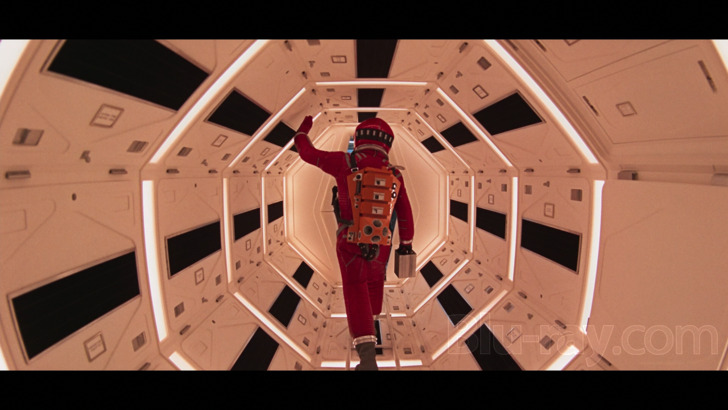
As with the video side of things, I could detect no difference in the tracks on this disc when compared to those on the Warner disc, and so this section repeats some of my previous review. 2001: A Space Odyssey features two DTS-HD Master Audio 5.1 tracks, one listed as restored and remixed (which the accompanying press sheet identifies as having been "completed in 1999 (for the previous DVD and Blu-ray releases)" and a new 5.1 repurposing of the original theatrical 6 track audio. I frankly didn't hear a ton of difference between the two in terms of actual surround activity, though occasionally individual effects like the "hiss" of air that underlies several sequences involving Dave either outside of the ship or inside after HAL has gone berserk sounded a bit more forward in the mix to my years in the original theatrical version. The biggest difference to me was a clear if arguably fairly slight brighter quality to the higher frequencies of the "restored and remixed" track, something that can be especially discerned during some of the music, especially some of the "odder" source cues that tend to play under scenes featuring the monolith. That said, you can hear what I'm talking about even in the "prelude" music that occurs during the first couple of minutes before any actual imagery begins. The original theatrical track's higher frequencies don't sound muffled in any major way, but they're not quite as bright (and some might say strident) as on the remixed version. That said, I was personally a bit more impressed by the low end on the original theatrical track than on the remixed version, though it's again a probably incremental difference. Again, during some of the louder music cues, there's a slightly rumbly quality that may be slight distortion but which I feel in some instances (notably the quote from Also Sprach Zarathustra) are probably endemic to the original recordings. As fans of the film know, dialogue in this outing is actually on the sparse side, but is always rendered cleanly and clearly, and the effects are typically often placed smartly in the surround channels to develop what is strangely both a kind of claustrophobic and a wide open mix. There are a number of fantastic sound design choices in the film that may actually startle newcomers to 2001, and I'd only point out how brilliantly Kubrick and his team actually utilize silence at some key junctures. There's been a lot of chatter about perceived "changes" to the video side of things with this release, but some who don't mind at least a bit of revisionism may wonder what a Dolby Atmos or DTS:X remix might have offered to this release, at least in addition to the "original" mixes included here, since the film's sound design certainly provides ample opportunity for those kind of effects, but the two tracks here should certainly satisfy most ardent audiophiles.
2001: A Space Odyssey 4K Blu-ray Movie, Special Features and Extras 
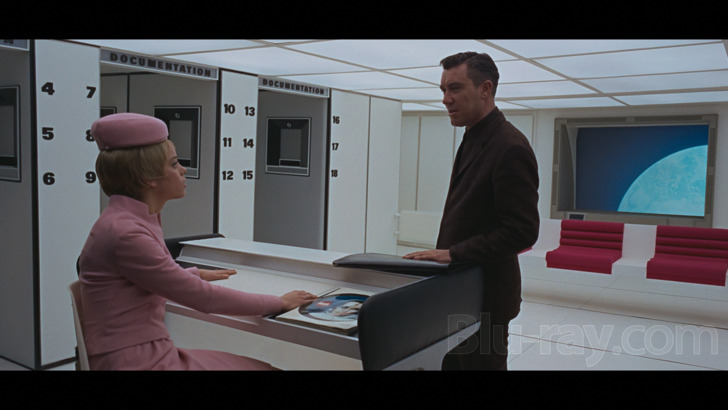
On Disc Supplements:
4K UHD Disc
- Audio Commentary by Keir Dullea and Gary Lockwood.
- 2001: The Making of a Myth (SD; 43:08) is an interesting retrospective with a number of talking heads discussing the impact of the film.
- Standing on the Shoulders of Kubrick: The Legacy of 2001 (SD; 21:25) features folks like Steven Spielberg and George Lucas discussing what the film has meant to them and the art of cinema generally.
- Vision of a Future Passed: The Prophecy of 2001 (SD; 21:31) looks at some of the things that seemed fanciful in 1968 which don't seem quite as much anymore.
- 2001: A Space Odyssey: A Look Behind the Future (SD; 23:11) is a longer form archival piece that includes production data and interviews and is kind of charmingly old school.
- What Is Out There? (SD; 20:42) is an interesting piece which seems to suggest that (if I may conflate famous quotes by both Fox Mulder and Colonel Nathan R. Jessup) we can't handle the truth out there.
- 2001: FX and Conceptual Artwork (SD; 9:33) features some interesting comments from Douglas Trumbull.
- Look: Stanley Kubrick! (SD; 3:15) is a brief piece focusing on Kubrick's work as a magazine photographer.
- 11/27/1966 Interview with Stanley Kubrick (1:16:31) is an audio interview conducted by Jeremy Bernstein that plays to a still image (HD) of the Starchild gazing on his new toy (Earth).
- Theatrical Trailer (SD; 1:51)
-
The Film Vault is obviously gearing these releases toward serious collectors, in terms of offering a unified appearance and the same sort of
non disc supplements included in each package. The outer box is approximately 9" high by 7 1/8" wide by 1 5/8" deep. The box has an acetate
O-ring slipcover branded with both the film title and The Film Vault's logo as well as numbering. This rigid clamshell box is emblazoned with newly
commissioned key art and itself features a kind of cool
magnetic clasp that opens to disclose a whole host of goodies. A CD sized digipack (in its own slipcover) holds both the 2160 disc and the 1080 disc
with bonus features, there
is a rather beautiful if
possibly useless exclusive individually numbered crystal display plaque (again with the film's title), seven replica lobby cards with added film quotes
(on glossy
cardstock), double sided reproductions of the original theatrical posters and a poster of the new
key art (which is quite striking). All of the
preceding are enclosed in another branded envelope. I've
uploaded a picture of the packaging under the appropriate tab on the
main review interface.
2001: A Space Odyssey 4K Blu-ray Movie, Overall Score and Recommendation 
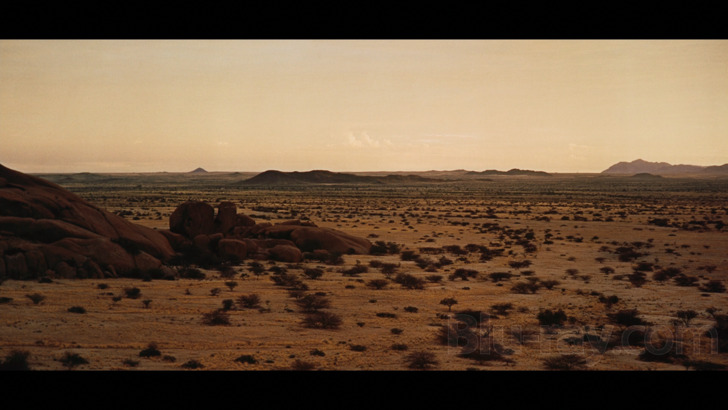
I loved Warner's Region A release from a few years ago, and while this Film Vault release kind of weirdly doesn't include the feature on a 1080 disc (one assumes due to licensing issues), this is otherwise pretty much a replication of Warner's technically excellent presentation of the feature film in 4K UHD, the extra disc of supplements, and some amazing non disc swag. Highly recommended.
Other editions
2001: A Space Odyssey: Other Editions

2001: A Space Odyssey
1968

2001: A Space Odyssey
Limited Edition of 2000 Copies
1968

2001: A Space Odyssey
Iconic Moments
1968

2001: A Space Odyssey 4K
Special Edition
1968

2001: A Space Odyssey 4K
1968

2001: A Space Odyssey
Premium Collection | Remastered
1968

2001: A Space Odyssey 4K
Titans of Cult
1968

2001: A Space Odyssey
Sci-fi Destination Series
1968

2001: A Space Odyssey 4K
1968

2001: A Space Odyssey 4K
1968
Similar titles
Similar titles you might also like

Ad Astra
2019

Interstellar 4K
2014

Moon 4K
2009

High Life
2018

The Man Who Fell to Earth
Vintage Classics
1976

Silent Running
Special Edition
1972

Outcasts
2010

Planet of the Apes
1968

Contact
1997

THX 1138
The George Lucas Director's Cut
1971

Arrival 4K
2016

Close Encounters of the Third Kind 4K
1977

Midnight Special
2016

Things to Come
1936

Gravity 3D
2013

Space: 1999: The Ultimate Collection
1975-1982

The Martian 4K
2015

Solaris
Солярис / Solyaris
1972

Passengers 4K
2016

Apollo 13 4K
1995